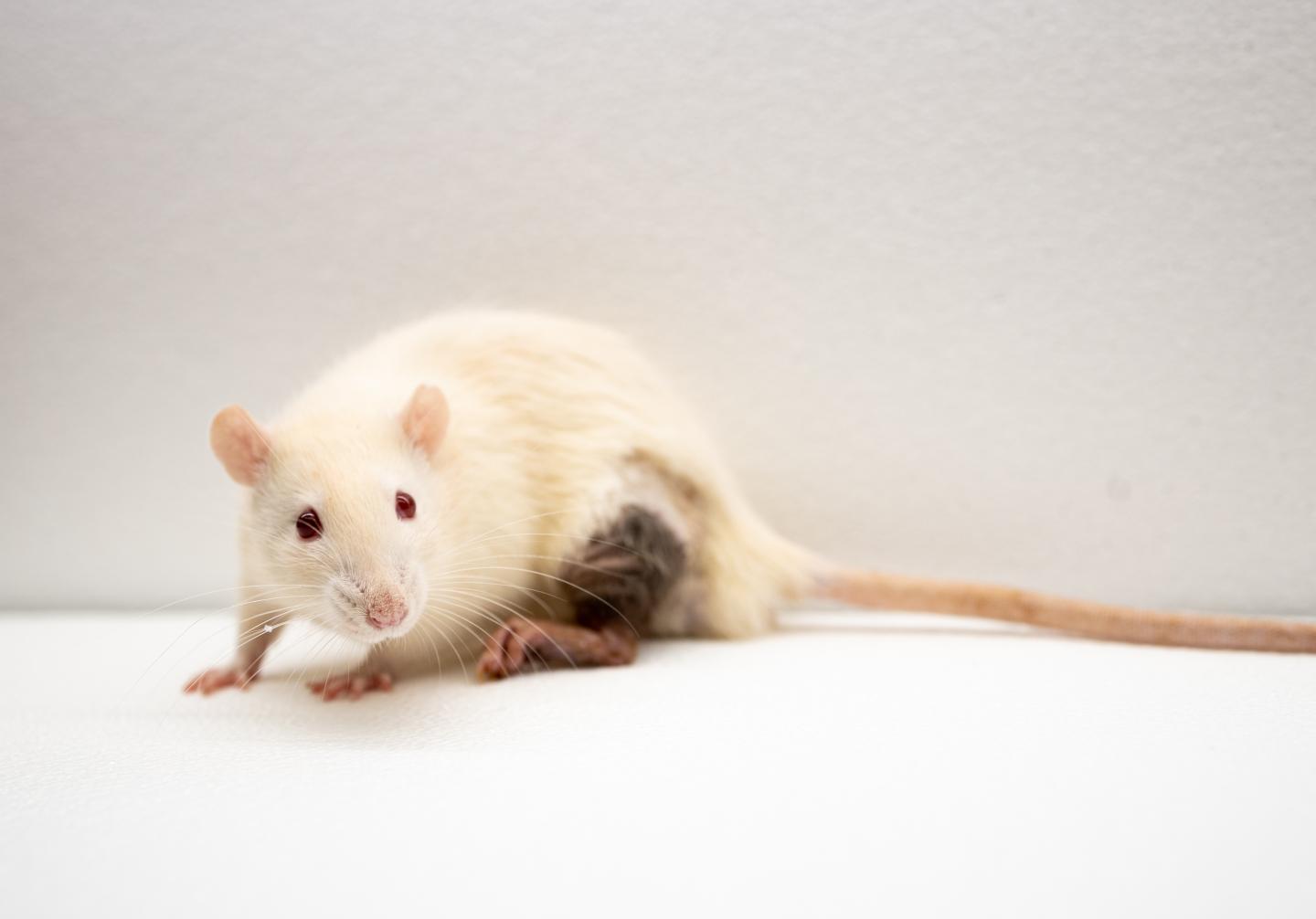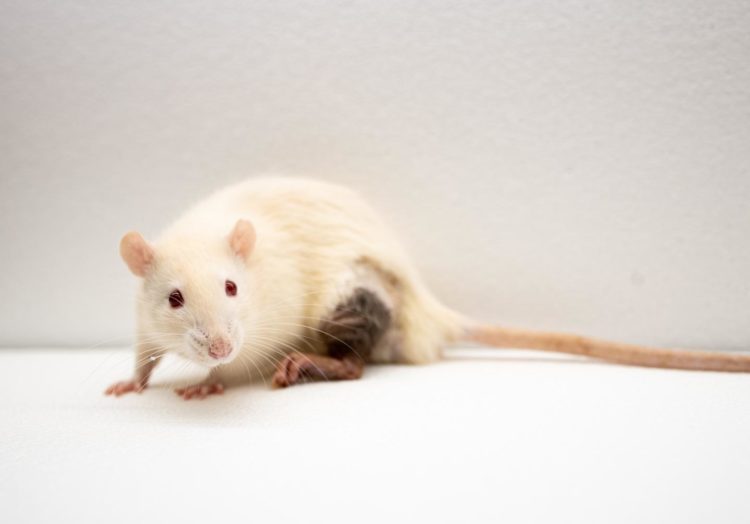
Credit: UPMC
PITTSBURGH, March 13, 2020 – Inspired by a tactic cancer cells use to evade the immune system, University of Pittsburgh researchers have engineered tiny particles that can trick the body into accepting transplanted tissue as its own.
Rats that were treated with these cell-sized microparticles developed permanent immune tolerance to grafts — including a whole limb — from a donor rat, while keeping the rest of their immune system intact, according to a paper published today in Science Advances.
“It’s like hacking into the immune system borrowing a strategy used by one of humanity’s worst enemies to trick the body into accepting a transplant,” said senior author Steven Little, Ph.D., William Kepler Whiteford Endowed Professor and Chair of chemical and petroleum engineering in the Swanson School of Engineering at Pitt. “And we do it synthetically.”
The advantage of a synthetic approach rather than cell-based therapy, which is currently in clinical trials, is that the treatment logistics are much simpler.
“Instead of isolating cells from a patient, growing them up in the lab, injecting them back in and hoping they find the right location, we’re packaging it all up in an engineered system that recruits these naturally occurring cells right to the transplanted graft,” said lead author James Fisher, M.D., Ph.D., a postdoctoral researcher in the Pitt School of Medicine.
The microparticles work by releasing a native protein secreted by tumors, CCL22, which draws regulatory T cells (Treg cells) to the site of the graft, where they tag the foreign tissue as “self” so that it evades immune attack.
Microparticle-treated animals maintained healthy grafts for as long as they were monitored — a little under a year, equivalent to about 30 human years. All it took was two shots to effect seemingly permanent change.
In a companion paper published recently in PNAS, the researchers showed that these engineered microparticles can train the immune system of one strain of rat to accept a donor limb from a different strain. This new paper shows that the effects are specific to the intended donor. Skin grafts from a third strain were rapidly rejected.
Today, transplant patients take daily doses of immunosuppressant drugs to avoid rejection, leaving them vulnerable to cancer, diabetes, infectious diseases and a host of other ailments that come along with a weakened immune system.
“These drugs hammer the immune system into submission so it can’t attack the transplanted organ, but then it can’t protect the body either,” said coauthor Stephen Balmert, Ph.D., a postdoctoral researcher in the Pitt School of Medicine. “We’re trying to teach the immune system to tolerate the limb, so that a transplant recipient can remain immunocompetent.”
The risks of lifelong immunosuppression are particularly problematic when the transplant isn’t a life-saving procedure. Doctors and patients have to consider whether the benefits outweigh the risks.
“The ability to induce transplant tolerance while avoiding systemic immunosuppression, as demonstrated in these innovative studies, is especially important in the context of vascularized composite transplantation where patients receive quality-of-life transplants, such as those of hands or face,” said coauthor Angus Thomson, Ph.D., professor of surgery and immunology in the Thomas E. Starzl Transplantation Institute at Pitt.
###
Additional authors on the study include Wensheng Zhang, Ph.D., Ali Aral, M.D., Abhinav Acharya, Ph.D., Yalcin Kulahci, M.D., Jingjing Li, M.D., Heth Turnquist, Ph.D., Mario Solari, M.D., all of Pitt; and Vijay Gorantla, M.D., Ph.D., of the Wake Forest School of Medicine.
This research was supported by the National Institute of Allergy and Infectious Diseases (R01-AI118777 U19-AI131453, R01-HL122489, T32-AI074490), National Institute of Dental and Craniofacial Medicine (R01-DE021058), the Department of Defense (W81XWH-15-2-0027 and W81XWH-15-1-0244), The Camille & Henry Dreyfus Foundation and the National Cancer Institute (T32-CA175294).
To read this release online or share it, visit https:/
About the University of Pittsburgh School of Medicine
As one of the nation’s leading academic centers for biomedical research, the University of Pittsburgh School of Medicine integrates advanced technology with basic science across a broad range of disciplines in a continuous quest to harness the power of new knowledge and improve the human condition. Driven mainly by the School of Medicine and its affiliates, Pitt has ranked among the top 10 recipients of funding from the National Institutes of Health since 1998. In rankings recently released by the National Science Foundation, Pitt ranked fifth among all American universities in total federal science and engineering research and development support.
Likewise, the School of Medicine is equally committed to advancing the quality and strength of its medical and graduate education programs, for which it is recognized as an innovative leader, and to training highly skilled, compassionate clinicians and creative scientists well-equipped to engage in world-class research. The School of Medicine is the academic partner of UPMC, which has collaborated with the University to raise the standard of medical excellence in Pittsburgh and to position health care as a driving force behind the region’s economy. For more information about the School of Medicine, see http://www.
About the Swanson School of Engineering
The University of Pittsburgh’s Swanson School of Engineering is one of the oldest engineering programs in the U.S. and is consistently ranked among the top 25 public engineering programs by U.S. News & World Report. The Swanson School has excelled in basic and applied research during the past decade with focus areas in sustainability, energy systems, advanced manufacturing, bioengineering, micro- and nanosystems, computational modeling and advanced materials development. More than 130 faculty members serve nearly 4,000 undergraduate, graduate and PhD students across six departments: bioengineering, chemical and petroleum engineering, civil and environmental engineering, electrical and computer engineering, industrial engineering, and mechanical engineering and materials science.
http://www.
Contact: Erin Hare (Health Sciences)
Office: 412-864-7194
Mobile: 412-738-1097
E-mail: [email protected]
Contact: Paul Kovach (Engineering)
Office: 412-624-0265
E-mail: [email protected]
Media Contact
Erin Hare
[email protected]
412-864-7194
Related Journal Article
http://dx.





